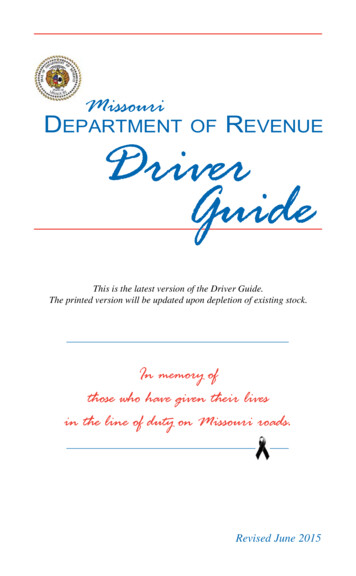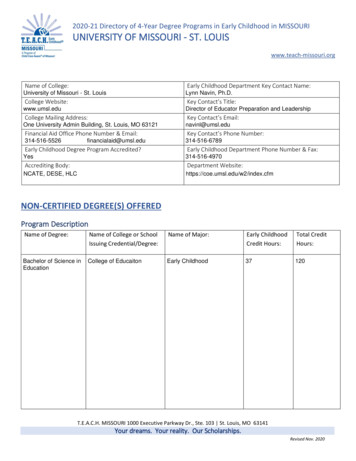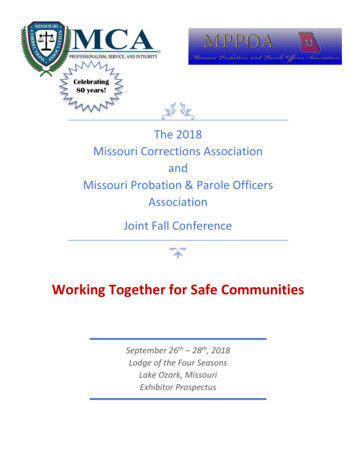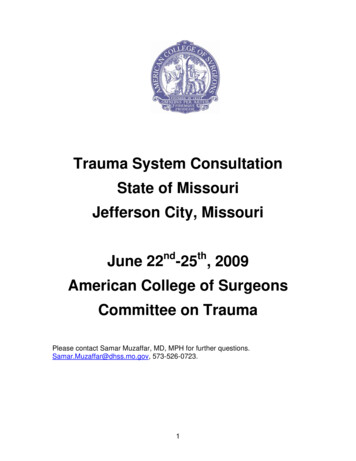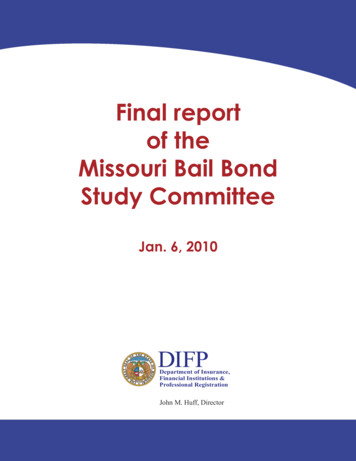
Transcription
Final reportof theMissouri Bail BondStudy CommitteeJan. 6, 2010DIFPDepartment of Insurance,Financial Institutions &Professional RegistrationJohn M. Huff, Director
Overview of StudyI.II.Executive SummaryHistory of bail bond regulation in MissouriIII.Committee established/HB 577 requirementsIV.SurveysV.Public hearings and meetingsVI.Issues and recommendationsVII.Appendix – proposed legislative language2
Executive SummaryIn accordance with HB 577, passed by the Missouri General Assembly and signed by Gov. JayNixon, the Missouri Department of Insurance, Financial Institutions and Professional Registration(DIFP) submits the following report on the current state of regulation of the bail bond industry inMissouri, along with recommendations for legislative, regulatory and policy changes. The lawrequires DIFP to submit a report to the insurance committees of the Missouri House ofRepresentatives and Senate by Jan. 6, 2010.The recommendations in this report were made by the Missouri Bail Bond Study Committee,established by the DIFP director. The department and committee are committed to improving theregulation and oversight of the bail bond industry and encourage the recommended changes bemade as they are essential to the successful operation of the bail bond industry in Missouri. Formore information on the committee and the process used in gathering information for the report,see page 5.The committee found numerous areas where enhanced state regulation is needed, including: Ban on allowing felons licensure in the bail bond industry More training and oversight of CE providers Implement financial pre-approval requirements and oversight Increased fines and enforcement for violations Prohibition on licensees from working in jails, law enforcement agencies or courts More specific statutory definition of the bail bond business Applying HB 600 (state income tax obligations) to licenseesThese and other recommendations are explained in greater detail throughout the report, beginningon page 7.It has been a privilege to undertake this investigation and submit the following report, which thedepartment believes will provide Missouri with significant improvements in the regulation andoversight of the bail bond industry.3
HistoryRegulation of the bail bond industry in Missouri began in 1983 with the passage andimplementation of Senate Bill 363. SB 363 provided for a dual-track system for posting criminalappearance bonds in Missouri. Provisions of SB 363 were amended with SB 267 in 2001 toinclude definitions for bail bond agent, general bail bond agent, property bail bondsman, suretybail bond agent, surety recovery agent and provisions related to surety recovery. SB 1122, passedin 2004, further amended the bail bond statutes to include licensure of surety recovery agents aswell as adding a number of other provisions to the bail bond laws such as initial basic training andcontinuing education provisions.Missouri statutes currently provide for licensure of: 1) bail bond agents who are employed by andwork for the authority of a property or surety general bail bond agent; 2) general bail bond agentswho are either surety agents or property bail bond agents and devote at least fifty percent of theirworking time to the bail bond business; 3) surety recovery agents.Surety bail bond agents are appointed by an insurer by power of attorney to execute or countersignbail bonds in connection with judicial proceedings and receive or are promised money or otherthings of value. Property bail bond agents pledge cash, property or other things of value assecurity for a bail bond in connection with a judicial proceeding and receive or are promisedmoney or other things of value.Various bills have been filed since 2004 to make changes to the bail bond statutes but have notpassed the General Assembly.On August 28, 2009, provisions of HB 577, the department’s omnibus insurance bill, became lawdirecting the Missouri Department of Insurance, Financial Institutions and ProfessionalRegistration (DIFP) to conduct a review of the regulation of the bail bond industry in Missouri.HB 577 included the following language:374.776. During the legislative interim between the first regular session and the second regularsession of the ninety-fifth general assembly, the Missouri department of insurance, financialinstitutions and professional registration shall conduct a study regarding its licensing rules andother policies and procedures governing the bail bond industry within the state of Missouri. Thedepartment, in its discretion, may hold public hearings within the state and permit testimony andinput from surety insurance companies, general bail bond agents, bail bond agents, legislators,law enforcement agencies, officials from the department, and other interested parties. If publichearings are held, the director shall provide notice to all licensees licensed under sections374.695 to 374.789 of the date, time, and location of such public hearings. The department shallsubmit a report of its findings and recommendations to the house of representatives and senateinsurance committees no later than January 6, 2010.4
Missouri Bail Bond Study CommitteeIn order to gather broad input in the review of regulation of the bail bond industry, DIFP DirectorJohn M. Huff appointed a 15-member bail bond study committee. This committee consists ofmembers of the Missouri legislature, law enforcement, the bail bond industry and the Missouricourt system.The director named the following members to serve on the committee:NameSenator Rita DaysRepresentative Brian YatesBrenda MarshallWilliam LaughlinAngela ParkJack AllisonBart CooperMichael ThomasRick AdamsNancy GriggsLaura EllisJudge Dan ConklinJudge Vernon Scoville IIISheldon LinebackCharles HeissGroup RepresentedGeneral AssemblyGeneral AssemblyBail Bond IndustryBail Bond IndustryBail Bond IndustryBail Bond IndustryBail Bond IndustryBail Bond CE ProviderAssociated Bail Agents of Missouri, Inc.Office of State Courts AdministratorBelton Municipal Court/MACAJudiciaryJudiciaryMissouri Police Chiefs' AssociationMissouri Sheriffs' AssociationGeographic AreaSt. Louis areaKansas City areaOzarkEldonRollaMexicoKansas City areaStatewideStatewideStatewideStatewideGreene CountyJackson CountyStatewideStatewideThe Bail Bond Study Committee held its first meeting on October 6, 2009, in Jefferson City. Atthis planning meeting, the committee discussed the scope of the committee’s mission, locations ofpublic hearings around the state, and surveys of the industry and courts to gather issues for furtherreview by the committee.Surveys of Bail Bond Industry and CourtsTo assist the committee in identifying issues for discussion, the department sent a survey to allindividuals licensed under Sections 374.695 to 374.789, RSMo. The cover letter for this surveyalso served as notice to all licensees as required in HB 577 of notice for public hearings and whereto sign up for e-mail notifications of the hearings on the department Web site. The departmentsent 1,041 surveys and 264 responses were returned. Survey responses were received from 90general bail bond agents, 168 bail bond agents, 3 surety recovery agents and two others who didnot indicate their occupation. Results of the survey were tallied and shared with the committee atits first meeting to begin the discussion on the various issues. Key issues from the survey areincluded in the Summary of Issues Identified by the Bail Bond Study Committee later in thisreport.5
It was suggested during the first meeting of the committee that a similar survey be sent to thecircuit courts to identify issues the courts would like to see addressed. Pursuant to this suggestion,a survey was sent by the Office of State Courts Administrator to 334 circuit and associate circuitjudges in the state. The department received 77 responses. Of the responses received, 47 werefrom associate circuit judges and 30 were from circuit judges. The issues identified by the courtsare also included in the Summary of Issues Identified by the Bail Bond Study Committee.Committee Public Hearings and MeetingsThe committee held four public hearings in October and November 2009. The first hearing washeld on October 20, 2009, at the Missouri Department of Transportation’s Office in Lee’s Summit.In addition to committee members and department staff, there were 30 in attendance with eightindividuals providing testimony to the committee.The committee held its second hearing on October 27, 2009, at the Missouri Department ofTransportation’s Management Center in Chesterfield. In addition to committee members anddepartment staff, there were 14 in attendance with six individuals providing testimony to thecommittee.The committee held its third hearing on November 3, 2009, at the Missouri ConservationDepartment Office Building in Springfield. In addition to committee members and departmentstaff, there were 23 in attendance with five individuals providing testimony to the committee.The committee held its final hearing on November 10, 2009, at the Capitol Building in JeffersonCity. In addition to committee members and department staff, there were 26 in attendance with 12individuals providing testimony to the committee.The committee also received written testimony from four individuals.At the conclusion of the public hearings, the committee held three additional meetings to developrecommendations and draft a final report and legislative language. These meetings were held inJefferson City on November 17, November 24 and December 17, 2009.Other StatesThe committee researched a number of other states that have strengthened their bail bond laws inrecent years. Florida, Arkansas and Colorado were referenced in a number of the surveyresponses and public testimony. The committee also looked to Virginia and Texas statutes forsample forms for the financial pre-approval requirements of the bond agents.6
Summary of Issues Identified by the Bail Bond Study Committee Prohibiting felons from licensure Additional requirements for general bail bond agent licensure - test, years as BBA Increase initial training requirement and approve CE providers Centralized, consistent financial pre-approval of property bail bond agents Increase amount allowed for certificate of deposit held by department Standard timeframe for forfeitures and judgments Increase fines and penalties for violations of laws Standardized power of attorney Bail bond regulatory board Approval process for bail bond agents moving from one general agent to another Cash bonds and 10% bonds by courts GED or high school diploma as requirement for licensure Bail bond licensees employed in a location where detainees are held Define bail bond business and what activities require licensure Compliance with HB 600 state income tax provisionsIssue 1: Prohibiting felons from licensurePrior to passage and implementation of SB 1122 in 2004, if an applicant had entered a plea ofguilty or been found guilty of a felony, there was cause for denial of a license. SB 1122 amendedthis restriction to “final adjudication or a plea of guilty or nolo contendere within the past fifteenyears in a criminal prosecution under any state or federal law for a felony or a crime involvingmoral turpitude whether or not a sentence is imposed, prior to issuance of license date;”.Survey responses from the courts and industry support the removal of the 15-year provision. Ofthe 264 industry surveys received, 211 indicated that the 15-year provision should be eliminated.Of the 77 court survey responses received, 70 indicated that the 15-year provision should beeliminated. A number of witnesses at public hearings also supported prohibiting licensure offelons.7
Florida and Arkansas prohibit licensure of felons, and Florida suspends the license of anyonecharged with a felony.Bail Bond Study Committee RecommendationThe committee voted unanimously in favor of eliminating the current provision which allows anew applicant who has not had a felony in the last 15 years to become licensed as a bail bondagent. Committee voted 10 to 1 in favor of prohibiting new applicants who have a conviction orSuspended Imposition of Sentence (SIS) for a felony from being eligible for licensure.Issue 2: Additional requirements for general bail bond agent licensureCurrent bail bond law requires applicants for general bail bond licensure to maintain their licensesas bail bond agents for at least two years before becoming eligible. Bail bond industry surveyresponses reflected that 85 individuals felt the current two year requirement is sufficient. Therewere 156 responses that indicated the two-year requirement should be increased. This issue wasdiscussed at all four of the public hearings and the most frequently suggested requirement wasfour years as a licensed bail bond agent. While the survey only addressed the two-yearrequirement, a number of witnesses provided testimony centered on increasing the qualificationsfor licensure in order to discourage those who were entering the business to “make a quick buck”and did not have the necessary experience or knowledge. After a lengthy discussion, thecommittee recommended requiring an additional examination for general bail bond agents thatwould test the applicant on general bail bond business practices and knowledge of thecollateralizing of bonds, court procedures, forfeiture and judgment provisions, as well as reportingrequirements and financial qualifying of assets.Bail Bond Study Committee RecommendationCommittee voted unanimously in favor of adding a testing requirement to the licensingqualifications for a general bail bond agent and increasing the length of time from 2 years to 4years as a bail bond agent before applying for a general bail bond license.Issue 3: Increase initial basic training requirement and department approval process for CEprovidersCurrent law requires, prior to the application process, bail bond and surety recovery agentapplicants to complete 24 hours of initial basic training. Additionally, all licensed general bailbond, bail bond and surety recovery agents must complete eight hours of biennial continuingeducation. Bail bond survey responses were divided 155 to 92 against increasing the initial basictraining requirement. The survey responses did indicate additional training was needed for newlicensees in the form of a one-year internship before full licensure by a vote of 133 to 131 in favorof a temporary one-year license. Public testimony at all four public hearings encouragedincreasing initial basic training with a number of individuals suggesting the equivalent of lawenforcement training requirements. Public testimony also expressed that the department needs to8
perform a more thorough review of classes offered by the training providers and to approve theclass instructors in addition to the approval of class curriculum. Committee members expressedthat additional training is needed but that existing training, both initial and continuing education, isnot always of the highest quality and often viewed by those attending as a waste of time andresources. Committee members expressed desire for the department to more actively monitorinitial training and continuing education classes as well as establish an approval process forinstructors in addition to approval of class curriculum.Bail Bond Study Committee RecommendationCommittee voted 9 to 0 with 1 abstaining to increase initial basic training from 24 hours to 40hours and by the same vote to leave the continuing education requirement at eight hours perbiennial licensure period; additionally, the department should by rule develop approval process forinstructors, require classroom setting for all instruction and actively monitor classes for followingapproved curriculum.Issue 4: Centralized consistent financial pre-approval of property bail bond agentsThis was one of the most frequently identified issues during the course of the committee’s study.Survey questions did not raise the issue specifically but responses were received pursuant to thequestion, “Do you think the current bail bond system in Missouri needs to be changed?”Seventeen written responses concerning consistency in being financially approved with the courtswere received. Some written responses were quite lengthy with examples from various courts inwhich licensees write bonds. The survey sent to the courts included the question, “Should thedepartment play a role in tracking a general bail bond agent’s assets and liabilities?” Judgesresponded 54 to 16 in favor of the department taking a role in tracking of assets and liabilities. Inpublic hearing testimony the committee heard from several court administrators who felt theexisting laws were not clear and were not being enforced consistently across the state. Committeemembers representing the judiciary and court administrators expressed concern over the workloadfinancial approval of agents would put on the already stressed court system. Industry membersstated submission of paperwork to multiple jurisdictions on varying schedules and with differentrequirements also creates a burden for the industry. Committee members representing the courtadministrators indicated they did not have the capacity to perform financial approval for allcounties centrally within the Office of State Courts Administrators. Department personnelsuggested adding the financial approval of agents to the existing structure of financial review ofinsurance companies. Committee members felt the department would be better equipped to absorbthis responsibility in consideration of the substantial additional resources that would be requiredby the courts if they were to perform financial approval in each jurisdiction. The committee hadlengthy discussions on what assets, reporting, ratios, limits and fees should be used for theprocess. Committee agreed department should make a pre-approved list available to the courts atleast monthly.9
Bail Bond Study Committee RecommendationCommittee voted unanimously that a centralized system of financial approval of agents should beestablished.Committee voted unanimously that DIFP become the centralized financial approval agent.Committee voted unanimously on quarterly filing of financial paperwork (once per year willrequire more documentation) with the flexibility to allow the department to request monthly, ifneeded.Committee voted unanimously to deem cash, certificates of deposits and real estate as allowableassets. Any other assets would require approval by department.Committee voted unanimously to require appraisals from an appraiser licensed in Missouri and toallow use of a tax statement, if an appraisal was not available.Committee voted unanimously for a 50.00 filing fee to be remitted to the department for thesubmission of quarterly financial filings.Committee voted unanimously to increase the application and renewal fee for all licensees to 300.00.Committee voted unanimously to require submission of monthly outstanding bond reports to thedepartment.Committee voted unanimously to use a ratio of 15 to 1 as for cap on bonds written to assetspledged.Committee voted unanimously to set a limit on any single bond written at 50% of total assetspledged. Courts would be allowed to approve higher bonds at their discretion.Issue 5: Increase certificate of deposit held by departmentCurrent law requires each applicant for licensure as a general bail bond agent post a duly executedassignment of ten thousand dollars to the state of Missouri. Bail bond survey responses, inaddition to written comments included with the survey, expressed that increasing the deposit heldby the department did not help with unsatisfied judgments to the courts. The deposit held by thedepartment is generally released to the courts only when the licensee has gone out of business.Under the existing system of qualifying in individual courts, the possibility for the unsatisfiedjudgments to exceed any deposit held by the department is almost assured. If agents were requiredto qualify centrally, those assets pledged as security should be sufficient and the deposit would notneed to be increased. Committee members also discussed the existing language that alreadyallows the department to increase the deposit up to 25,000, if the circumstances of the business ofthe general bail bond agent warrant additional funds.Bail Bond Study Committee RecommendationCommittee voted 6 to 3 with 1 abstaining in favor of increasing the maximum deposit currently instatute from 25,000 to 50,000 with the minimum required bond amount to remain at 10,000.10
Issue 6: Standard timeframe for forfeitures and judgmentsThe comments included on the survey responses as well as public hearing testimony indicate thatthe existing statutes in Missouri for forfeiting a bond have been a source of confusion, not only forthe bail agent, but for the courts as well. The committee researched several other states andreviewed how the bond forfeiture process varied within the state of Missouri. Missouri courtsvaried in the time allowed from ten days to over one year before the full bond amount is due thecourt. Most courts do not record a civil judgment against the general bail bond agent in a bondforfeiture, thereby allowing the general to show the asset as unencumbered and use the asset toestablish a new general bonding company. The committee had lengthy discussions on the need fora standardized and appropriate timeframe. The committee agreed that the Greene County CircuitCourt system currently in place allowing the bond agents 90 days before judgment is entered andanother 90 days if the full amount of the bond is posted provided a very workable bond forfeitureschedule for both the court and the bond agent. The committee felt it was important to allowcourts flexibility in extending forfeiture periods as the desired result is always for the defendant tobe recovered and to appear in court. The committee also felt it was important to allow sufficienttime for the agents to recover the defendant. The committee recognized that tracking the bondforfeitures will require additional work for the courts, but their recommendations call forautomation to assist in this process. The committee felt the benefits of tracking the forfeitures (i.e.higher appearance rates, increased forfeiture revenue for the schools and for the municipalities andholding all general bond agents to the same standards) offset what hopefully will be minimaladditional tracking if automation is maximized.The committee pointed out that Missouri law allows a municipality to file a forfeiture in circuit orassociate circuit court.479.210. In case of a breach of any recognizance entered into before a municipal judge or anassociate circuit judge hearing a municipal ordinance violation case, the same shall be deemedforfeited and the judge shall cause the same to be prosecuted against the principal and surety, oreither of them, in the name of the municipality as plaintiff. Such action shall be prosecuted beforea circuit judge or associate circuit judge, and in the event of cases caused to be prosecuted by amunicipal judge, such shall be on the transcript of the proceedings before the municipal judge. Allmoneys recovered in such actions shall be paid over to the municipal treasury to the generalrevenue fund of the municipality.Bail Bond Study Committee RecommendationCommittee voted 10 to 1 in favor of allowing 90 days from a defendant’s failure to appear untilbond forfeiture is entered, unless a bond forfeiture hearing is requested by the bail bond agent.Committee voted 10-1 in favor of allowing a 90-day minimum extension on judgment if the fullamount of the bond is tendered to the court while allowing for courts to extend the final judgmentwithout tender for good cause. The committee voted unanimously that the following be deemedgood cause: (1) The defendant is incarcerated somewhere in the United States and is unavailablefor return to the court; (2) The defendant was incarcerated somewhere in the United States afterthe date the defendant fails to appear and prior to the date of final judgment; (3) The defendant is11
being held in another jurisdiction and the bail bond agent asks the court for leave to return thedefendant to the court issuing the warrant; (4) The defendant has been deported; (5) The death ofthe defendant; and (6) Other just causes accepted by the court. The committee also votedunanimously that 30 days after final judgment the court shall distribute the amount tendered inaccordance with the laws.If the amount has not been tendered, the committee recommended that the courts immediatelyrecord the forfeiture in the same manner as a transcript judgment. If the forfeiture is in amunicipal division, the committee recommended that the municipality follow the procedureprescribed in 479.210, RSMo and immediately file an action in circuit court. The committeerecommended changes to JIS, the case management system for state courts and 40 municipalcourts, so that judgments are automatically recorded at the end of 90 days, unless the aboveconditions were met. Many of the municipalities use similar software systems and it was thecommittee’s recommendation that with a standardized procedure, the software systems can bemodified so the process is as automated as possible. The committee emphasized that this is acompromise, an attempt with a standard procedure to allow the bond agent time to find and deliverthe defendant and provide the court assurance that the bond would be forfeited in due time if thedefendant cannot be located.Issue 7: Increase fines and penalties for violations of lawsThe bail bond survey questions did not address increasing the fines and penalties for violations.Testimony that this was needed was included at each of the public hearings. Hearing commentsrevolved around the central idea that the department be granted stronger enforcement authorityand levy fines in amounts that serve as deterrents to further violations of bail bond laws. Thecommittee members were in agreement that it was not enough to pass the laws but also that theyneed to address the violations and provide the department with sufficient resources to carry out theenforcement.Bail Bond Study Committee RecommendationCommittee voted unanimously that the department needed increased fines and increased resourcesfor enforcement.Issue 8: Standardized power of attorneyPublic hearing testimony and committee discussions supported the creation of a standardizedpower of attorney form. This template, which the general bail bond agents could producethemselves, would provide courts with consistent information and assist courts in identifyingfraudulent powers of attorney. A consistent and complete power of attorney form would alsoassist the courts in notifying agents when forfeitures occur.12
Bail Bond Study Committee RecommendationCommittee voted unanimously for the power of attorney to be in the form and manner prescribedby the department with the understanding that such format, as opposed to the form itself, would beprovided by the department.Issue 9: Bail bond regulatory boardThe industry and court surveys did not address the issue of a bail bond regulatory board. Publichearing testimony raised the issue of creating a professional licensing regulatory board within thedepartment’s Division of Professional Registration. Staff from the Division of ProfessionalRegistration provided a presentation to the committee on the process and costs involved withestablishing a regulatory board. Board members would be appointed, not elected by the industry.Each professional board is required to pay its own expenses of operation including, but not limitedto licensing activities, legal costs and a proportionate share of administrative support staff. Legalrepresentation for the board would be provided by the Attorney General’s Office and the boardwould be billed for costs associated with such representation. The committee compared estimatedcosts of continued regulation by the department versus regulation by an appointed board. Thecommittee also discussed establishing an advisory board to the department, which would beappointed by the director.Bail Bond Study Committee RecommendationCommittee voted 7 to 2 in favor, with 1 abstaining, for the establishment of an advisory grouprather than a regulatory board. Committee then voted 9 to 2 in favor of having the advisory groupbe an ad hoc (not in statute) advisory group called together by the department as needed.Issue 10: Approval process for bail bond agents moving from one general agent to anotherIndustry survey responses indicated by a tally of 148 to 95 that a bail bond agent should berequired to obtain a release from his/her current general bail bond agent prior to working for a newgeneral bail bond agent. This would allow the former general agent to ensure all powers ofattorney were accounted for and all funds were received as required. While there was limitedpublic testimony on this issue, one written testimony referenced the Florida statute that providesfor an appointment approval process to be used when a bail bond agent changes from one generalagent to another. The committee, after much discussion, was still split on whether it shouldremain a contractual issue between the general agent and bail bond agent or if there is a need torequire department involvement. The department currently has authority to take disciplinaryaction against a licensee if, after an investigation, a bail bond agent is proven to not haveaccounted for all powers of attorney and funds.Bail Bond Study Committee RecommendationCommittee voted 4 to 5 with 1 abstaining that the department not be involved in approving thetransfer of an agent from one general to another. Committee encouraged department to takedisciplinary action on those found guilty of not accounting for all funds and POAs.13 pag
appearance bonds in Missouri. Provisions of SB 363 were amended with SB 267 in 2001 to include definitions for bail bond agent, general bail bond agent, property bail bondsman, surety . bail bonds in connection with judicial proceedings and receive or are promised money or other things of value. Property bail bond agents pledge cash, property .


